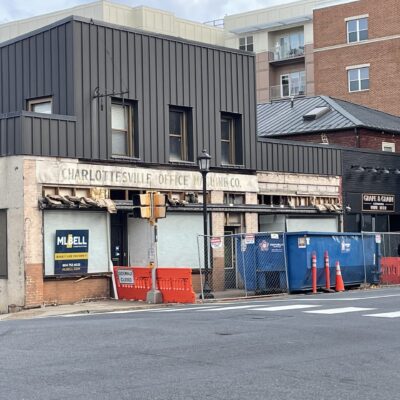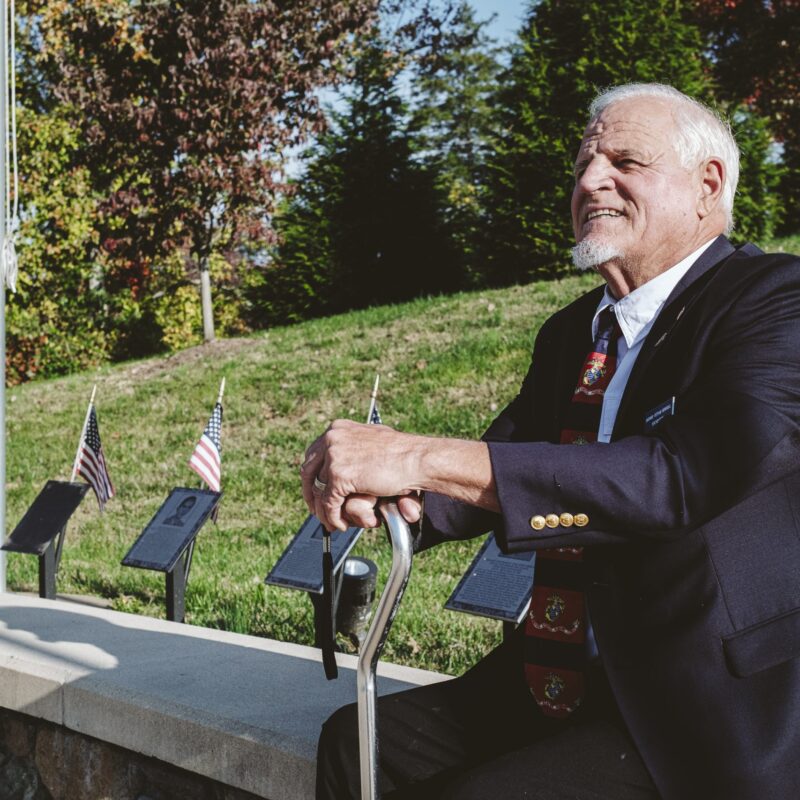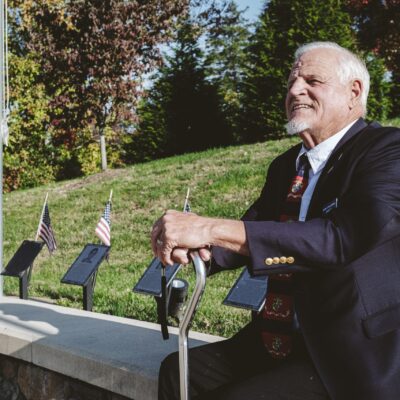 With no day shelter, the homeless are left to wander the streets. |
| Related articles:
Homeless shelter closed over permit [November 9] Help, I need somebody How the other 20 percent lives Building a homeless day haven |
In July 2004, local reference librarian Jim Barns wrote a letter that appeared in The Daily Progress. "The plight of the homeless comes to my conscience quite often," he wrote. It was true, the Market Street branch of the Jefferson-Madison Regional Library where he works serves as a shelter of sorts for area homeless who often have a place to stay at night but nowhere during the day. It did back then and it still does. Go in through the front door and downstairs and take a look around. In the middle of the afternoon it is packed with vagrants.
"A project to provide low-cost housing for the homeless would be beyond my understanding," Barns continued. "However, providing a space where these people could spend the day seems very reasonable. It would be a place to play cards, watch TV, drink coffee, sit, nap, a place for their children to do homework and, most of all, a place to stay warm." As the librarian ended his letter he implored his readership. "Is there someone out there with the wherewithal to lead this drive? The money is here, but the will has to be tapped first."
That someone turned out to be Jim Barns. "I felt like it was a time to do something in my life," he says, and so started to hold meetings with the various community members who responded to his plea, including city councilor to-be Dave Norris, who was soon to start his own homeless shelter.
The result of all the conversation was the formation of COMPASS Day Haven a year later to provide day shelter services to the homeless. The first COMPASS employee was Erik Speer, who was hired as a part-time project coordinator in early 2006. After graduating from UVA’s English department, Speer decided that he wanted to become a chef and moved to New York while he waited to get into culinary school. It was there in the early ’90s, "after the Reagan years," as he says, that he first encountered the homeless. "There were three sleeping on my doorstep," he remembers. As he struggled to rise in his new field he found himself taking long walks around the city. "I saw people down and out." Then as he proceeded to work in restaurants he couldn’t but help notice the bums rooting through the dumpsters. "I worked for high-end places," he says. "We were throwing out expensive shrimp and lobster."
Speer continued in food, running a catering business in the Outer Banks area of North Carolina but got burned out, he says, and returned to Charlottesville where as part of his job he did research at the Market Street library. It was there that he noticed the people hanging out during the day. "I started talking to the homeless," he says.
It was also there that he met Barns and discovered they shared a passion for the less fortunate. "I have a heart for people that feel apart," Speer says.
His initial efforts as COMPASS’ project coordinator led to a proposed site for a day shelter on Meade Avenue. A city grant of $25,000 was awarded in July 2006 to pay for rent and services, but just as they were to start up the landlord got nervous, and backed out.
 Like Lee Park next door, the library is a haven for the homeless. |
As Barns and Speer looked elsewhere, fate seemed to step in when film director Tom Shadyac—of Ace Ventura, Liar Liar, and Bruce Almighty fame—returned to the site of his college years to film parts of his newest movie, Evan Almighty, and expressed an interest in helping the homeless. By November 2006, he had agreed to purchase the First Street Christian Church for $2.5 million, but only on the contingency that a special use permit be granted for a day shelter. It would be run by COMPASS.
Just down the street from the library and across from Lee Park, the church would be a one-stop shop for the homeless. Downstairs would be the COMPASS day shelter, showers, lockers and a community kitchen. Upstairs a beautiful old sanctuary that could be used as an arts space or general enrichment. On the next level and all around would be additional space for all the entities that serve those on the low end of the economic food chain, including job, housing and medical services.
An open house coincided with the premiere of Evan Almighty in June of this year to announce the whole venture. As people were led on tours of the old site, optimism abounded. "I have a burden wherever there’s a need," Shadyac said at the time, standing in the sanctuary, "and there’s a need in this community." Unlike Los Angeles, for instance, Charlottesville’s homeless population—more than 200 strong, according to the Thomas Jefferson Area Coalition for the Homeless—was much more manageable. "It seems solvable," he said.
More than half a year later, renovations have finally started on a church that supporters expected would already be open by now. "The construction piece takes longer than you would hope," explains Norris. As the founder of PACEM, a group that provides evening shelter to the homeless, he supplied the initial inspiration for Shadyac when the latter heard him speak. "We’ve got a good steering committee overseeing the programming side of things," Norris says. "That’s all going great."
What’s not, he might have said, is the day shelter side of things. Almost as soon as the movie director left town, COMPASS started on a course that by August left them without a fiscal agent, and out of the church. "COMPASS was involved from the beginning, they’re no longer involved, but we’re confident that somebody’s going to be able to run a day shelter there," Norris says. "A lot of people think the church is one big day shelter, but there’s a lot of other things going on."
 City Councilor Dave Norris provided the initial inspiration for the purchase of the First Street Church. "The construction piece takes longer than you would hope," he says. |
One of those will be to serve as the intake site for PACEM. The Latin word for "peace," it is also an acronym for "People And Congregations Engaged in Ministry," an interfaith organization started by Norris four years ago to provide shelter, meals and support to the homeless in the Charlottesville area. Running from November through March, the evening shelter is hosted by 46 different church congregations that put the men and women up at nights for a week or two at a time. Every night, the homeless must check in at Holy Comforter Catholic Church between 5pm and 6pm. Then they are driven to whatever respective church sanctuary is waiting, full of fold-up cots and a coterie of volunteers to feed them.
"The homeless are not going away," says Mark Mulawa. "They come and they go but they don’t go away."
He is standing outside the back of Westminster Presbyterian Church smoking a cigarette with a man who has just retched on the ground. The man is a guest of the church tonight but not Mulawa. Tonight, he is the overnight attendant, but four years ago, in PACEM’s first year, he was actually spending nights at the shelter after having moved to Virginia to work on a farm for his parents. Originally hailing from Michigan, Mulawa had grown up with an alcoholic abusive father. "He was mean as a snake," he says. "He was narcissistic, his way or the highway."
Mulawa was only 11 or 12 when he first started running away from home. "It was safer on the streets," he says. At the age of 15 he and a friend hitchhiked to his grandparents’ home in Mineral, Virginia, but continued to move around, traveling and getting odd jobs. He returned to Michigan to finish high school but lived with parents of friends to escape life at home. "I was always jealous of the other kids in the neighborhood because they had normal families," he says. After high school he bounced around, working jobs like roofing or in restaurants.
A stint in the Army interrupted his wandering ways. After that he settled in Oregon, married and had a kid. That marriage fell apart, though, and when his parents got in touch with him, trying to mend a damaged relationship, Mulawa agreed to come to Mineral to work on the farm inherited from his grandparents.
Unfortunately, he quickly found himself in a familiar situation. "It was like I owed him something," he says of his father. "No matter what I did he treated me like when I was 15, like dirt."
"Dad was drinking all the time—I wasn’t, I quit—and he got very angry, so I had to leave but had nowhere to live," he says. So Mulawa stayed with the PACEM program for a few months. Even so, he was soon back at the farm, but when he got custody of his youngest son he decided to leave again. This time he ended up at the Salvation Army on Ridge Street where he and his son became residents in their transitional living program. "I went there knowing there’s not a place for a man and his son at PACEM," Mark says. "Thank God, because we didn’t belong in a shelter."
It was while staying with PACEM in its first year that Mulawa got the notion that he might like to work for them. "I thought about asking Dave for a job, and I was helping out anyways," he says. "I thought this would be right up my alley. I’m very familiar with these people."
A normal night for him begins around 8pm when he arrives at the shelter. This one seems rather mundane, although he was too late for the police who showed up earlier and took one guest off to jail. Now, though it is only 8:30pm, at least half of the men have already crawled into their cots. The loudest noise is the continual snoring that issues from behind the curtain.
"The first year was kind of crazy," he says. "We had to tame the regulars, let them understand the rules and the fact that they won’t be able to stay if they can’t change their behavior."
Last year, when Mulawa was working at the women’s shelter, a lady went into convulsions. She had apparently downed a bottle of liquor shortly before entering PACEM and it caught up with her at the shelter. "I kept her head turned to the side so that if she threw up—which she did a couple times—not to choke on it," he says. "She was raising her head and bouncing it on the hard tile floor. And another arm kept flailing and I held that down." He and the others waited until an ambulance and the police came, and took her out on
a stretcher.
Tonight is quite different. By 10, only a few men are awake, peering at the visage of Meg Ryan on a TV. Over at a table a man sits, babbling to no one. "I believe we’re doing the right thing," Mark says. "Every year we get a little more evolved, and better at what we do. We don’t want anybody to freeze in the wintertime, and nobody in this town is going to starve."
In addition to the chronically homeless, PACEM also serves as a refuge for the 50 percent of Charlottesville’s homeless who are working poor. "You have the people who work labor jobs and housing is expensive," he says. "That seems to be a huge problem. It would take three people to go in on a place making $8, even $12 an hour. It’s expensive for housing and food."
Tired of waiting
By this past July, it had been a year since COMPASS had received their city grant and three years since Barns had written his letter. Despite all their efforts, they really seemed no closer to helping the homeless. The First Street Church was at least a year away from being completed. Another winter was on the way.
"We’ve got another year to go," Speer says of his thoughts at the time. "What should we do?"
 In April, film director Tom Shadyac christened the church he had bought to help the homeless. In August, he broke up a fight over how best to serve them. |
At the same time, a recent COMPASS hire, Mary Washington, seemed to have taken hold of the group. In June she was named CEO and chair of the board by Jim Barns, who says he had no desire to run the day-to-day affairs of the group.
If they were going to have to wait for the renovated church building, Washington had an idea. Instead of merely treating the homeless, why not house them? "We were looking at the wrong sunbeam," Speer says.
Soon, COMPASS began to talk with Louise Wright, who had taken over the lease of an assisted-living facility called Monticello Ridge Crossing, on the corner of Monticello Avenue and Ridge Street and across from the Salvation Army. Wright was finding that the operations of an assisted-living facility were more detailed and challenging than she had originally conceived. Would Wright consider housing the homeless instead? Washington wanted to know. They could set up a facility for transitional living. The homeless could stay for up to a year as they worked toward getting back on their feet, and most importantly, acquiring their own house. In turn, COMPASS would provide services during the day to those that lived there.
As COMPASS set off on this new path, others questioned the wisdom of their move, including then employee Beth Elliott, who challenged their decision to branch out as careless and irresponsible. "Passion without a plan is going to be a problem," she says.
Hired in early 2007 as a consultant for COMPASS, Elliott had in turn hired Washington. Now the two were going head to head over the direction of a group whose name belied its unstable nature. Within weeks of announcing its new plan, doubts were being raised about COMPASS and its new leader with Elliott taking her concerns to others on the steering committee as well as COMPASS’ fiscal agent, the Virginia Organizing Project (VOP).
By July 19, Elliott had been pushed out of Compass as they continued to plan toward the opening of Monticello Ridge. Meanwhile, internal documents show that turmoil continued to brew, reaching a head on August 15 when Washington and Barns issued a letter to Shadyac and the VOP’s executive director, Joe Szakos. "The church was purchased by Tom Shadyac for COMPASS Day Haven," it read in part. As such, COMPASS was asserting control over the development of the church. "In light of this, all Church Steering Committee tasks are being placed on ‘hold’ effective today," it ordered. "Therefore, this is notice that all volunteers’ services and meetings relative to the church planning should cease immediately until further notice…"
It was a brazen move that was returned in kind three days later when the VOP sent a letter to Speer. "Dear Erik," it began. "The Virginia Organizing Project State Governing Board has decided to discontinue its joint plan of work with COMPASS Day Haven effective August 18, 2007," citing a lack of "internal control" and "clear decision making structure and process" as two of its motivations.
 As part of PACEM, many area entities administer to the homeless in various ways, like this placemat drawn by a local second grader. |
The letter was a decisive blow. With VOP removing itself as fiscal agent, suddenly COMPASS could no longer accept funds. Worse, the money they already had—a $25,000 grant from the city and $10,000 from BamaWorks, the charitable arm of Dave Matthews Band, was refunded by the VOP. Some of the money had already been spent so that the city was shortchanged some $12,000, and wanted to know where the funds had gone.
A little more than a week after being dropped by the VOP, COMPASS met to form a board—their third try—when a member spoke up. "We move to make a motion to vote no confidence in our leader," he said. By the end of the month the controversy had even reached Shadyac, 3,000 miles away, who stepped in to put Norris and a local realtor who had procured the church in charge of the project.
When the VOP canceled their joint plan of work with COMPASS, Speer and Washington were suddenly out a paycheck but remained undeterred. "She just barrels ahead," Barns says of Washington. By September she had convinced Wright to have her church act as COMPASS’ fiscal sponsor, freeing them up to receive an $8,000 grant in September. That was the result of 40 UVA students sleeping outside for eight nights. Private donations continued to trickle in as COMPASS pushed forward with their concept of providing permanent housing for the homeless.
According to an agreement worked out with Wright, she would provide a place for 26 homeless to live for up to a year. COMPASS would work with the men and women, providing day services much like they would have at the First Street Church. "We would put a wrench in the cycle," Speer says, "and stop the fear that was keeping them mobile."
As soon as Wright agreed (around the end of September/early October), Speer began interviewing numerous candidates among the homeless, some of their names provided by the Salvation Army and others by Region Ten. Word began to spread in homeless circles so that they eventually had a pool of more than 60 candidates.
One of those was Paul, who came to this area from West Virginia with his fiancé so she could be treated at UVA Hospital. When she died, Paul ended up out on the streets and at the Salvation Army. Then one day he ran into Speer and put in an application for Monticello Ridge. Soon, he was taking a TB test and COMPASS was running a background check on him.
In October, as Speer continued to line up residents, the city began to question the project’s zoning. Monticello Ridge was only allowed to operate an assisted-living facility under a nonconforming use permit that defined its purpose as serving the "aged, infirm, and disabled." From the city’s perspective, COMPASS was trying to do something else altogether, even though they and Wright argued otherwise. "When you’re bringing in people off the street, you’re definitely bringing in the aged, the infirm, the disabled," Wright contends.
After seeming to waver, the city eventually stepped in, and on October 31 barred Monticello Ridge from opening the day before its scheduled debut. For the next few days, the new residents were allowed to stay at COMPASS and the city tried to line up places for them to sleep. "It was surprising when I was trying to find rooms for the homeless that night how little there is available," city spokesman Ric Barrick says. Some like Paul ended up back over at the Salvation Army.
 Every winter night, 30 men seek shelter inside PACEM’s welcome arms on cots just like this one. |
"I was hurt and disappointed," he says. "I didn’t want to come back over here. I liked it over there. I had my own room; it was comfortable and nice with nobody to bother you."
Others followed COMPASS over to the Hope Community Center on 11th Street NW. "We were already consulting with them," Washington says of the switch to a new location. "We’ve had a number of irons in the fire, people we’ve been talking to for opportunities to service the homeless."
Homeless like Gerald. "When I cook I don’t cook for me, I cook for everybody," he says on a recent Wednesday evening. It is 9:30 at night and he is standing before a pot of boiling hot dogs in one of Hope’s kitchens. "I volunteer. Somebody’s doing something positive for me because right now I don’t have a home. I’m grateful for this facility."
For the past week Gerald has been working for a fast food restaurant, then returning to the Hope Community Center to cook for the other men. "I work at McDonald’s but people don’t know what I have to go through when I’m away from McDonald’s," he says.
"Even though I have a job it’s still a couple months before I can jump into something because I got to save and pay the existing bills that are already adding up," he continues, pausing to peer into the hot water. "Some people here are comfortable with that because they will never do anything, but then you have the ones like myself who are working hard and just need that one chance."
Another COMPASS client, Debra, weighs in. "I think it was unfair for [the city] to do us like they did," she says. She is sitting at a round table in another room of Hope’s where homeless women and a few children will spend the night. On November 1, she made the trip from Luray to Charlottesville to move into Monticello Ridge, only to find out she had no home. A week later, she was at Hope Community Center and has been spending her nights there ever since. During the day, she looks for work. "I’ve been applying at every place," she says, adding that a fast food job might be a possibility. In the other room a few women sit on a floor covered with bedding since COMPASS has yet to line up cots for them. "This is a good place to stay but I want to be out on my own," says Debra.
"I like it here, I really do," says another lady who takes a seat. "They’ve been helping me, giving me directions." According to her, she’s been staying there at nights for two weeks now but has been homeless for two years. She’s been taking medication, provided through Region Ten. "I’ve been in PACEM and the Salvation Army and out of all those, this is the best thing that ever happened," she says. "That’s just straight up."
Woke up, fell outta bed
Mornings at PACEM start early. By 4:30am some men are already up, with the rest rising at 5 when Mulawa goes from cot to cot, stirring the weary. Some, like Oscar, are gone by 5:30, when the first bus comes to take them back out into the world. "Half of them spend their day over in the park," he says. "The other half are at Labor Ready, either they go out during the day or they don’t."
Oscar has been in town for less than a month. Hailing from the Christiansburg area, he had been living with an old lady, helping out around her house for room and board, but in the rural countryside could not find regular work. "There’s no work down there, and I hate sitting around the house all day," he says. So Oscar came to Charlottesville looking for work. So far, he has found little, even though he has spent many of his mornings at Labor Ready waiting to be assigned work. Unfortunately, jobs were rare. In three weeks, he had only found four or five days of work, all for $10-$12 an hour.
The day before, he says, he sat at Labor Ready until 9, but left when he was assigned no work. "I’m not going to sit up there all day waiting," he says. "I’m not going to do nothing but hang out."
Today, he is trying to scrape together enough bus fare to get out to the Virginia Employment Commission office on Hydraulic Road. "I can do a lot of things," he says, listing the laying of sheetrock, painting, and landscaping among his many abilities. "If they’re paying $8, I’ll take it. Anything less it’s not enough money."
If he cannot find the fare, though, he doesn’t know what he’ll do. There is no day shelter to spend his time. COMPASS’ role in providing a place for the homeless to dwell during the day has fallen apart. Once its guiding force, Speer has decided to step back. "I don’t have a real sense of clarity to my purpose," he says. "I put my life on hold for a long time doing this, and I’ve got to get my life together. I have to help myself or I’ll be homeless."
True to form, Washington remains defiant and seems intent on taking some sort of legal action against a city and others she sees as having conspired to stop COMPASS. "I’m so fed up with this crap," she says. "They’ve taken our money unethically and in every uncouth way. It’s all to squash us completely. They’re not going to kill us."
The First Street Church Project rolls along as well, albeit without COMPASS, and will likely open some time next fall or winter. "The project is a single piece of the puzzle," says Speer, even as he considers what to do next with his life. "It’s not the solution. The solution is permanent housing."
Meanwhile, someone like Oscar is left to roam the streets or wind up somewhere like Lee Park. Anywhere, he says, but where the founder of COMPASS still works. "I’m tired of going to the library and looking up things."





